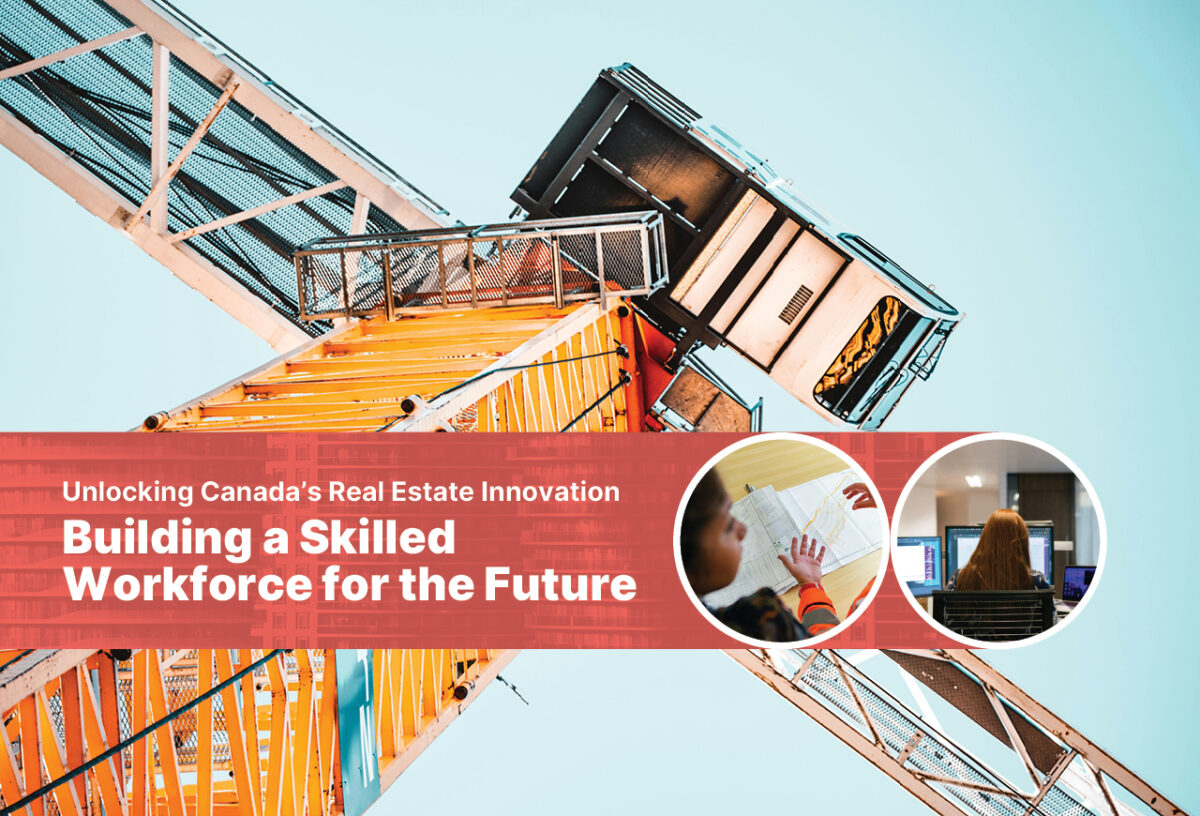The Dawn of the Innovation Map for the Industrialization of Housing in Canada
Sae-Hee Shin
on
October 22, 2024
A way to transform housing, Canadian productivity, and prosperity – addressing everything from trees to keys, and everyone has a role to play.
On October 10th, 2024 a diverse group of innovators across various industries including real estate, manufacturing, forestry, technology, finance, infrastructure, and government from Canada and other parts of the world helped take Industry Innovation in Canadian Real Estate to the next level with the creation of the Innovation Map for the Industrialization of Housing.
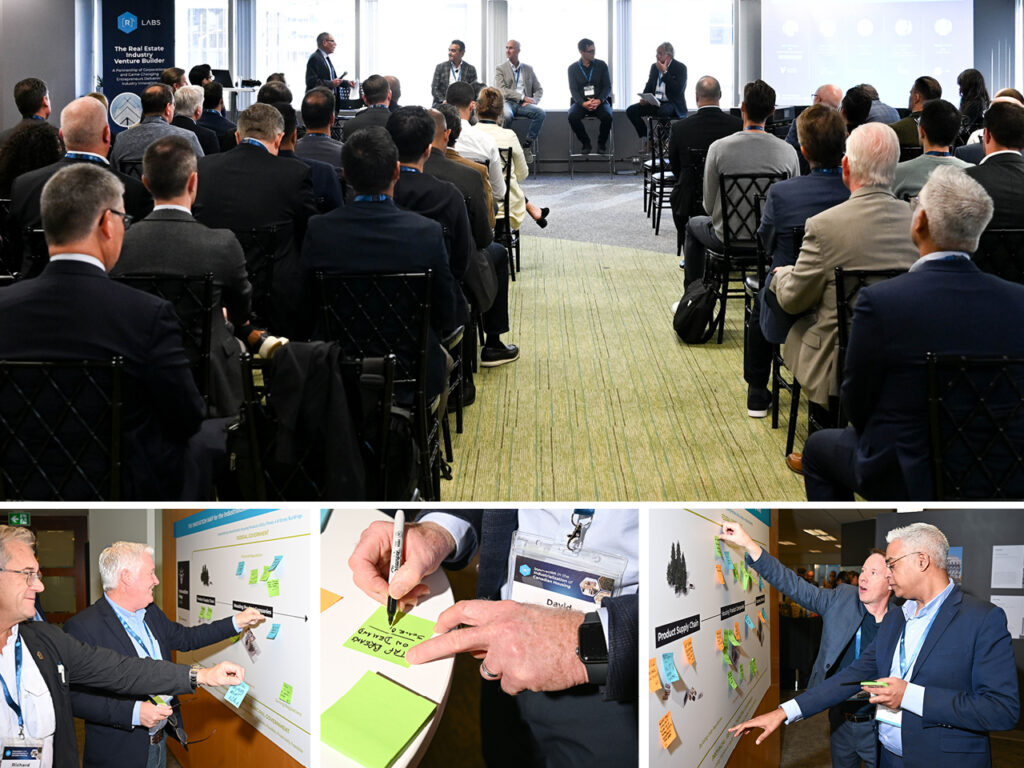
What if our biggest problems were our greatest opportunities?
Is the current housing condition in Canada a crisis or the raw materials for our greatest opportunity? Research from CMHC in 2022 showed Canada needs to create 5.1 million new homes over 8 years, but in our best days, the housing industry in Canada has only been able to create a third of that number. We not only need to create three times more housing than we ever have before, but that housing also has to be affordable across the entire housing continuum, be sustainable with a reduced carbon footprint, and be resilient.
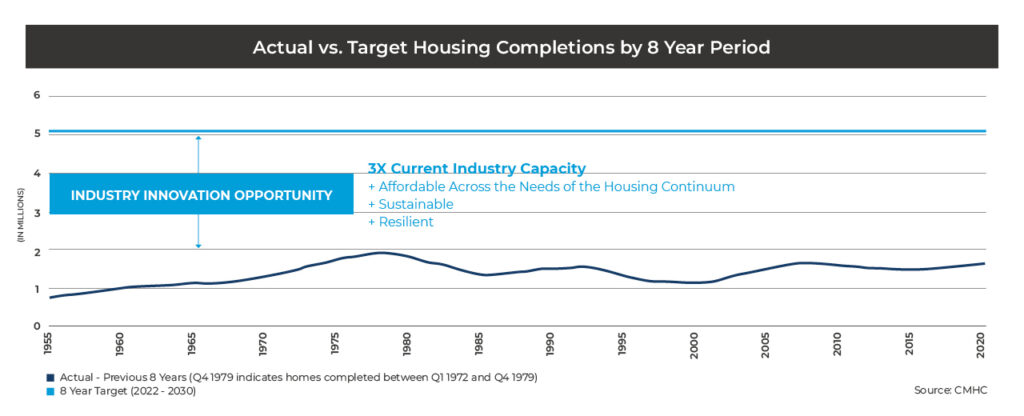
The Industry Innovation Agenda for Canadian Real Estate (Vision with Action)
There is a great formula on the Lab wall (as those who have been to R-LABS know). Outcome = Event + Response. On November 28, 2022, the Industry reflected on the crisis in real estate and housing as the event and asked “What if, together, we created an Industry Innovation Agenda?” (That was the industry’s “Crisi-tunity” moment.)
That good work was done through 2023 with the R-LABS Industry Issue + Transformation Council and in March 2024 the (world’s first) Industry Innovation Agenda in real estate was launched containing 5 areas of focus and 4 types of action.
With over 20 pledges and growing, the Council recently looked ahead to 2025, applying the learnings from Industry Innovation in our past and asked, “What is the one thing that can make progress on everything?”
The Industrialization of Housing – A Bold Focus in 2025 with the Power of Transforming Housing and Canada
Housing is something we are literally all in together. By continuing to apply lessons from around the world and expanding partners across multiple industry sectors, Canada is charting a course to an incredibly exciting future.
"If you want to go fast – go alone. If you want to go far – go together"
African proverb
We realize that we have far to go and in taking this bold journey together, we will need a map. “Maps tell us where we’ve been, but their true power lies in guiding us toward what we have yet to discover.” On this day, a small group of industry innovators and pioneers helped set a vision and chart a course to an incredibly exciting road ahead for a better future for housing and Canada.
Questions addressed included:
- What are the roles of Federal, Provincial and Municipal Governments?
- What are the roles of Non-Profit and Standard Setting Organizations?
- What are the novel new businesses that we need to create that could be in the form of born global companies?

Solving Housing and Productivity
Giles Gherson noted that the industrialization of housing relates to his top concern as CEO of the Toronto Region Board of Trade: declining productivity. “It’s very much tied up in the productivity question because employers need employees to be housed in relative proximity to where they work. So solving the housing problem is almost Job #1.”
As former Economic Development Deputy Minister for Ontario, Gherson has watched with interest the shift of the province’s automobile manufacturing base toward electric vehicle production, leading to the loss of jobs in the conventional car parts industry. Perhaps housing industrialization could provide a new way forward for advanced manufacturing, he suggested.
“Ontario's manufacturing sector, once Canada's powerhouse for productivity and economic growth, has faltered over two decades. GDP contribution has dropped 17% since 2002, productivity lags at 70% of U.S. levels, and per-worker investment fell from 79% to 55% of U.S. levels since 2014.”
Giles Gherson
Wood Can Do More Good
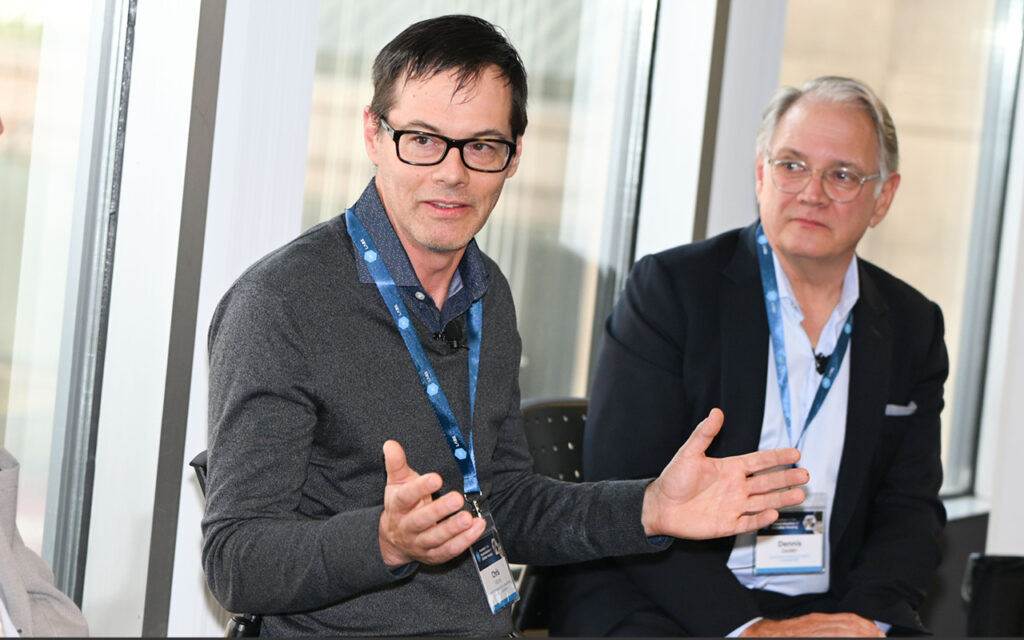
(left to right) Chris Walton, CEO (CRIBE) and Dennis Darby, CEO (CME)
Chris Walton, CEO for the Centre for Research & Innovation in the Bio-Economy, said the industrialization of housing represents an opportunity to use locally sourced lumber, “and keep the economic value of Ontario wood here in Ontario and increase domestic lumber production.”
Using mass timber gets a builder 40% of the way to decarbonization of the building, he noted. And using OSB plywood that’s made 100% of wood, with residual chemicals in turn used to create bio-based resins, can improve the sustainability of the structure.
“That’s the future of housing strategy, and industrializing the homebuilding process would accelerate that,” Walton said. “But piloting and demonstrating that these innovations work is essential. And we need to build more than just a storage locker to show it works. We need to think big.”
Canada is Currently Decades Behind – But We Have So Much Potential
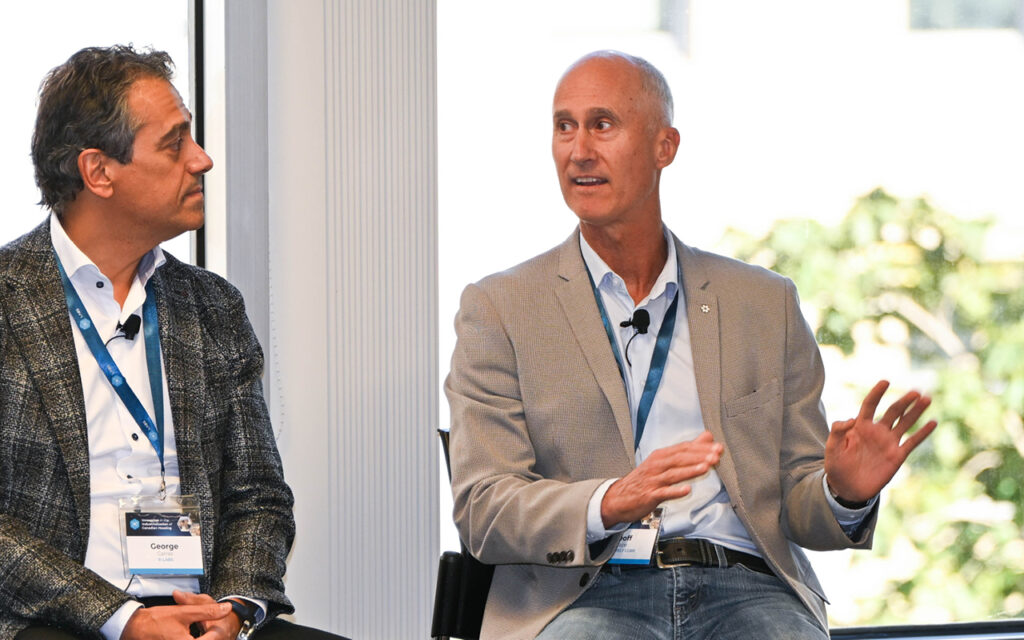
(left to right) George Carras, CEO (R-LABS) and Geoff Cape, CEO (Assembly)
Geoff Cape, CEO of Assembly (formerly R-Hauz), an R-LABS partner company and growing leader in prefabricated mass-timber and light frame buildings solutions, said Canada is at the very beginning with housing industrialization. “We’ve just come back from Sweden and they’re 30 years ahead on this.”
A leading builder over there opened a 465,000 sq. ft. prefabrication facility. “They’re producing high quality end products with a viable business plan that’s feeding further investment.”
Canada could build a facility half that size that uses automation and robotics to build housing components, Cape said. “The challenge here is that there isn’t the supply chain network feeding it like with the auto industry. And banks don’t want to lend to these projects.
So demand is there, the requirement for innovation in the space is absolutely there, and everybody understands it intuitively. But it represents a change in an industry that is terrible at change.”
“Now the ecosystem in Sweden has expanded around them and there is a parts supply industry for housing. We know how to do this stuff in Ontario,” Cape added.
Advanced Manufacturing Can Play a Growing Role in Housing
Dennis Darby, CEO of the Canadian Manufacturers and Exporters association, told the panel that 80% of Ontario’s GDP comes from exporting manufactured goods, mostly to the U.S.
It shows Ontario has the ecosystem to support the industrialization of housing. “All the components would be pre-made, and we have the skilled workers and the lean production methods,” he said. “It’s an opportunity in Ontario because we have the human capital and the techniques.”
Advanced manufacturing technology would work for housing for a number of reasons, including speed, with modular components assembled in weather-controlled factories; efficiency, with lower per-unit costs; reduced waste; and quality control, as defects are eliminated in prefabrication.
“During the pandemic, manufacturing became sexy because we needed PPE,” Darby said. “Canadian manufacturers pivoted to do that, and we can do that again. And housing is equally as much of a challenge. Almost 50% of Canadian manufacturing is in Ontario, so there’s huge potential here.”
Piloting Our Way Forward
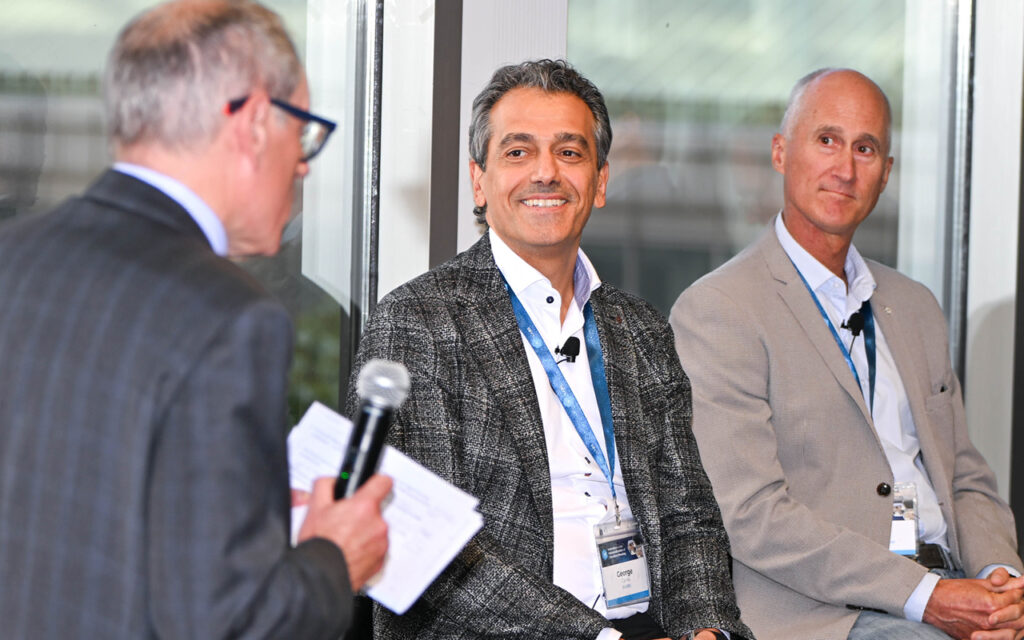
(left to right) Giles Gherson, CEO (TRBOT) George Carras, CEO (R-LABS), and Geoff Cape, CEO (Assembly)
“There are only two outcomes on the road ahead – Winning and learning” George Carras said. “Industrializing housing will require properly constructing pilots and ventures that could contribute to new housing solutions at scale, and this represents a massive value creation opportunity for corporations, inside and outside of real estate today, entrepreneurs and governments.”
Finding Your Opportunity on the Map ahead

(left to right) Giles Gherson (TRBOT), George Carras (R-LABS), Geoff Cape (Assembly), Chris Walton (CRIBE), Dennis Darby (CME)
As the Industry Venture Builder, R-LABS is strategically charting and managing the innovation ecosystem for the Industrialization of Housing in Canada across all stakeholder groups. Find your role: Get Involved Here






